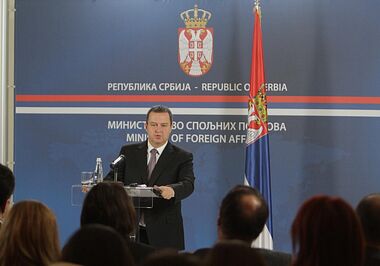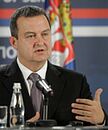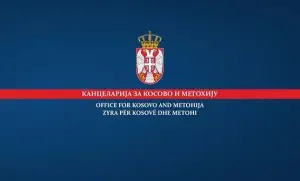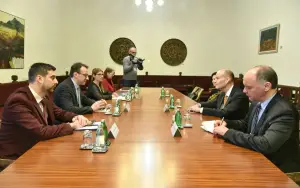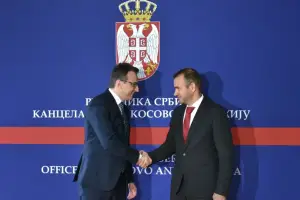Q:
A:
Continued diplomatic struggle against Kosovo's admission to UNESCO
21 October 2015
First Deputy Prime Minister and Minister of Foreign Affairs Ivica Dacic said tonight that Serbia needs to continue its fight because there are great chances that the General Conference of UNESCO in November rejects recommendations for Kosovo to enter this organisation.
At an impromptu press conference at the Foreign Ministry regarding the decision of the Executive Council of UNESCO to recommend to the General Conference that Kosovo be admitted to UNESCO, Dacic said that the greatest countries in the world today supported Serbia, including China, Russia, Brazil, Mexico and India and there were five abstentions among those that have recognised the independence of Kosovo (Japan, South Korea, Malawi, Egypt and Papua New Guinea).
He stated that the admission of Kosovo was supported by Afghanistan, Albania, Austria, Belize, the United Kingdom, Gabon, Gambia, Guinea, Dominican Republic, El Salvador, Estonia, Italy, Kuwait, Macedonia, Germany, Pakistan, Saint Kitts and Nevis, Thailand, Togo, United Arab Emirates, France, Netherlands, Montenegro, Czech Republic, Chad and Sweden.
According to Dacic, those that were against included Argentina, Angola, Brazil, Ecuador, Ethiopia, India, China, Cuba, Morocco, Mexico, Namibia, Nigeria, Russia and Spain, Dacic expressed gratitude to those countries.
There were 14 countries that refrained from voting: Algeria, Bangladesh, Egypt, Indonesia, Japan, South Korea, Mauritius, Malawi, Mozambique, Mali, Nepal, Papua New Guinea, Trinidad and Tobago and Uganda, while representatives of Tunisia, Turkmenistan and Ukraine were not present, he added.
Dacic said that the Executive Council of UNESCO adopted a recommendation that Kosovo be admitted to the organisation without any debate, and the vote has shown that there are huge divisions within the international community, as well as within UNESCO.
The First Deputy Prime Minister and Minister of Foreign Affairs pointed out that an explanation will be sought from those who have supported Kosovo's membership in UNESCO, first of all, from Montenegro and Macedonia.
Dacic stressed that the great struggle against Kosovo's admission to UNESCO is imminent, and Serbia will act calmly and rationally, without any irrational moves.
He said that Serbian Prime Minister Aleksandar Vucic late yesterday spoke with the Prime Minister of Papua New Guinea, that today abstained from voting and was asked that his country withdraws from the list of co-sponsors for the admission of Kosovo to UNESCO.
Also, Dacic stated that he spoke with several foreign ministers, and will continue to do so in the future.
The Prime Minister will hold talks with countries that may wish to change their attitude towards this issue, such as the United Arab Emirates, said Dacic.
The First Deputy Prime Minister and Minister of Foreign Affairs stressed that Serbia’s stance is that this is an unlawful act and that Kosovo has neither legal qualifications, nor may it apply for membership because of the attitude towards the Serbian cultural heritage in Kosovo and the Serbs.
Dacic announced that activities engaging Prime Minister Aleksandar Vucic and President Tomislav Nikolic will continue, and the whole society is expected to be involved in the communication of attitudes and arguments why we are against Kosovo's admission to UNESCO.
The Executive Council of UNESCO by majority vote today proposed that Kosovo be admitted into the organisation – the proposal was supported by 27 members of this body, 14 were against, with as many abstentions.
A possible decision that Kosovo be admitted to UNESCO will be discussed at the General Conference from 3 to 18 November, and the decision must be supported by a two-thirds majority of 195 member states, of which 111 have recognised Kosovo, while 84 have not.
He stated that the admission of Kosovo was supported by Afghanistan, Albania, Austria, Belize, the United Kingdom, Gabon, Gambia, Guinea, Dominican Republic, El Salvador, Estonia, Italy, Kuwait, Macedonia, Germany, Pakistan, Saint Kitts and Nevis, Thailand, Togo, United Arab Emirates, France, Netherlands, Montenegro, Czech Republic, Chad and Sweden.
According to Dacic, those that were against included Argentina, Angola, Brazil, Ecuador, Ethiopia, India, China, Cuba, Morocco, Mexico, Namibia, Nigeria, Russia and Spain, Dacic expressed gratitude to those countries.
There were 14 countries that refrained from voting: Algeria, Bangladesh, Egypt, Indonesia, Japan, South Korea, Mauritius, Malawi, Mozambique, Mali, Nepal, Papua New Guinea, Trinidad and Tobago and Uganda, while representatives of Tunisia, Turkmenistan and Ukraine were not present, he added.
Dacic said that the Executive Council of UNESCO adopted a recommendation that Kosovo be admitted to the organisation without any debate, and the vote has shown that there are huge divisions within the international community, as well as within UNESCO.
The First Deputy Prime Minister and Minister of Foreign Affairs pointed out that an explanation will be sought from those who have supported Kosovo's membership in UNESCO, first of all, from Montenegro and Macedonia.
Dacic stressed that the great struggle against Kosovo's admission to UNESCO is imminent, and Serbia will act calmly and rationally, without any irrational moves.
He said that Serbian Prime Minister Aleksandar Vucic late yesterday spoke with the Prime Minister of Papua New Guinea, that today abstained from voting and was asked that his country withdraws from the list of co-sponsors for the admission of Kosovo to UNESCO.
Also, Dacic stated that he spoke with several foreign ministers, and will continue to do so in the future.
The Prime Minister will hold talks with countries that may wish to change their attitude towards this issue, such as the United Arab Emirates, said Dacic.
The First Deputy Prime Minister and Minister of Foreign Affairs stressed that Serbia’s stance is that this is an unlawful act and that Kosovo has neither legal qualifications, nor may it apply for membership because of the attitude towards the Serbian cultural heritage in Kosovo and the Serbs.
Dacic announced that activities engaging Prime Minister Aleksandar Vucic and President Tomislav Nikolic will continue, and the whole society is expected to be involved in the communication of attitudes and arguments why we are against Kosovo's admission to UNESCO.
The Executive Council of UNESCO by majority vote today proposed that Kosovo be admitted into the organisation – the proposal was supported by 27 members of this body, 14 were against, with as many abstentions.
A possible decision that Kosovo be admitted to UNESCO will be discussed at the General Conference from 3 to 18 November, and the decision must be supported by a two-thirds majority of 195 member states, of which 111 have recognised Kosovo, while 84 have not.

